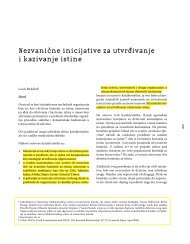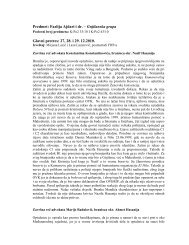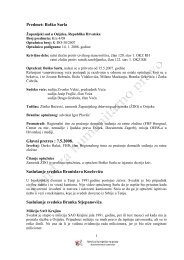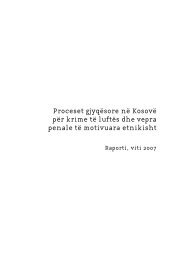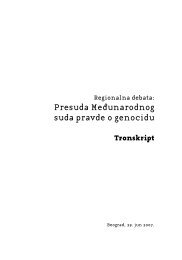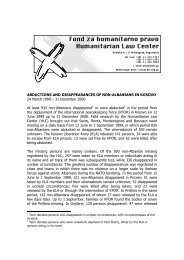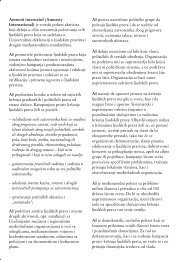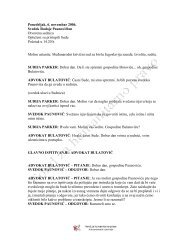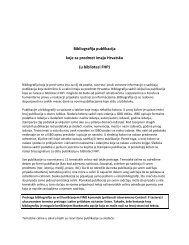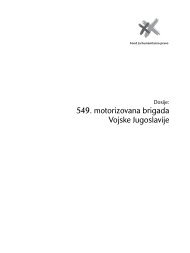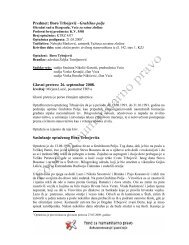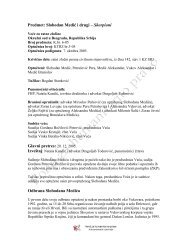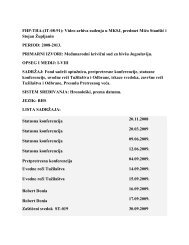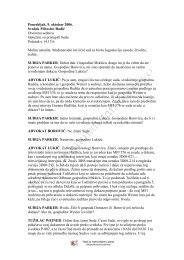here - Humanitarian Law Center/Fond za humanitarno pravo
here - Humanitarian Law Center/Fond za humanitarno pravo
here - Humanitarian Law Center/Fond za humanitarno pravo
You also want an ePaper? Increase the reach of your titles
YUMPU automatically turns print PDFs into web optimized ePapers that Google loves.
Examining the conduct of proceedings and the interpretation of the new code's provisions, judges<br />
seem to have been best prepared for the implementation of the new CPC. The Office of the War<br />
Crimes Prosecutor, in contrast, still remains passive and offers insufficient, unconvincing<br />
evidence to corroborate allegations in its indictments. For that reason, the courts have assumed a<br />
leading role in establishing the facts of a case (even though the CPC does not require them to do<br />
so), either by encouraging parties to propose evidence or by the taking of evidence ex officio.<br />
Prosecutors and defense counsels seldom use the new procedural means envisaged in the CPC,<br />
such as cross-examination of witnesses and t<strong>here</strong>fore do not sufficiently use leading questioning<br />
techniques in cross-examination.24<br />
That the Office of the War Crimes Prosecutor was not adequately prepared for the application of<br />
the new procedural rules became apparent in the Tenja 2 case. The indictment against Boža<br />
Vidaković and Žarko Čubrilo, was the first indictment that the Office of the War Crimes<br />
Prosecutor brought in accordance with new rules. The Office of the War Crimes Prosecutor<br />
announced this ‘first’ in a press release issued on that occasion. Following receipt of the<br />
indictment, dated 8 February 2012, the Belgrade High Court returned it to the Office of the War<br />
Crimes Prosecutor as the section concerning the particulars of the indictees had not been drafted<br />
in accordance with the law. After the Office of the War Crimes Prosecutor had corrected these<br />
deficiencies, the Court again sent it back because the prosecutor had failed to list specific<br />
evidence with respect to each of the essential elements of the criminal offences charged. They<br />
added the information required and filed the indictment again on 11 June 2012. The Court again<br />
returned it because of ambiguities with respect to the commission of the offences charged.<br />
10. Courts fail to act in accordance with the <strong>Law</strong> on Free Access to Information of<br />
Public Importance<br />
In the reporting period, the High Court in Belgrade denied a request from the HLC to access<br />
some non-final court rulings, which had been made in accordance with the <strong>Law</strong> on Free Access<br />
to Information of Public Importance. The reason given for its refusal was that sending the<br />
requested rulings might seriously impede further conduct and conclusion of court proceedings.<br />
The HLC found this unacceptable, particularly because all court proceedings are open to the<br />
public.<br />
Thus, the HLC filed two complaints regarding decisions of the High Court in Belgrade with the<br />
Commissioner for Information of Public Importance and Personal Data Protection. In August<br />
2012 the Commissioner accepted one of the complaints and ordered the High Court to make the<br />
requested ruling in the Medak case available to the HLC. The Commissioner’s decision in this<br />
matter states that the High Court in Belgrade “failed to offer a valid argument justifying the<br />
23<br />
24<br />
Report on War Crime Trials in Serbia for 2011, HLC, p.14.<br />
Article 98 (3) of the CPC (“Official Gazette of the RS“, Nos 72/11 and 101/11)<br />
13




